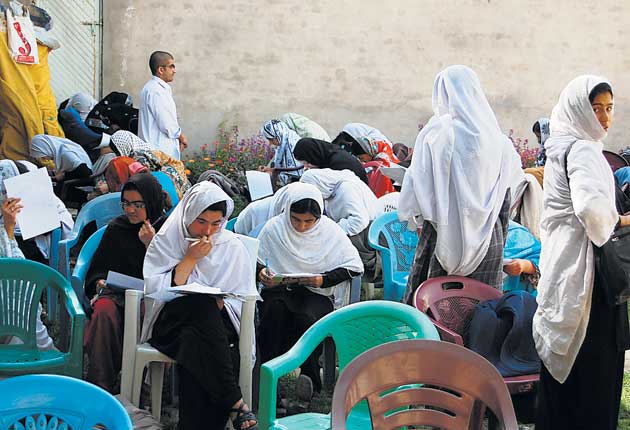Afghanistan's women defy militants to learn to read
In the Taliban heartland, women are again going underground to get an education. Julius Cavendish reports from Kandahar

Unsuspected by their Taliban neighbours, hundreds of women in Afghanistan are attending secret literacy classes, defying the militants in some of their most redoubtable strongholds. In dozens of villages across Zabul province, the mountainous landscape where the insurgency first spluttered to life, underground programmes have sprung up in mud-walled houses under the guise of Koranic study-groups.
The exact locations are secret, but, in an interview with The Independent, the man behind the covert schools said they have reached 29 villages and around 450 students. Ehsanullah Ehsan has devoted his life to educating women in some of the most culturally conservative places on earth.
"You can't start in villages by announcing, 'Hey, send your daughters, send your wives because we're teaching school subjects'," he explained. "No. We tell them: 'Your women need to understand prayer. Don't they?' They say, 'Yes'. And I slip through school books."
Mr Ehsan speaks with passion as he explains why he risks educating girls and women in parts of the country where the Taliban and other Islamists have burned down schools, murdered teachers and sprayed acid on female pupils.
"It was crazy. It was painful to me," he said. "I always saw that – why do women have to wear burqa, not men? Why do women have to be treated so inhumanly? My mother was the one who loved me most. It was my mother who nursed me. Why alienate half of humankind? So, I thought, I have to do what I can do."
The lessons concentrate on Pashto literacy, arithmetic and health and hygiene, although Mr Ehsan hopes to expand the curriculum to include history, ethics and science. Where he has been unable to smuggle through textbooks, teachers explain the subjects on blackboards or in their pupils' notebooks.
Although it is not possible to visit the classes, his story is just one of several reports of an appetite for learning seemingly at odds with southern Afghanistan's cultural conservatism.
Sources in Helmand say that, last summer, residents in Sangin district smuggled books past Taliban checkpoints by concealing them in carpets. A British official out there claimed "books move freely throughout Sangin" but conceded that government educators still face enormous threats. Recently, residents sprung the district director of education from Taliban captivity after it emerged that the militants planned to behead him.
In Kandahar city, no oasis of calm but somewhat more secure than the outlying districts, Mr Ehsan has managed to establish a private school where girls study leadership and finance, communicating with teachers in Australia and Canada via Skype. "I'm here because I want an education," 19-year old Saida Hasemi said. "After I graduate I'll get married and go to university, inshallah."
In less urban contexts, secret home schools are the only way forward. The phenomenon is reminiscent of an extraordinary secret programme that provided an education for hundreds of thousands of girls when the Taliban were in power. Despite increasingly draconian bans on female education, which eventually forbade girls of all ages from learning anything involving books and letters, foreign and Afghan aid workers and teachers would organise lessons in secret at private homes, in caves and under the cover of boys' schools.
Today, nine years after the Taliban regime was toppled, the same tactics are being employed in areas where the insurgents' presence deters families from allowing their daughters to continue learning. However, while the Taliban is often blamed, there are creeping fears that it is Islamists unaligned with the insurgency who may be primarily responsible for the anti-education intimidation.
Women's rights advocates say the fear of kidnapping, rape, harassment and other forms of dishonour are all factors in parents keeping their daughters from studying. The most recently available data from the Education Ministry shows that 102 schools were bombed or set on fire between April and August last year.
However, there are seeds of optimism. The number of children enrolled in primary education in Afghanistan is at an all-time high of six million. Still, there is a dramatic drop in student participation at secondary school level, especially among girls.
A recent report by Human Rights Watch highlighted how important education is in combating the mishmash of honour codes and Islamic fundamentalism that has evolved in Afghanistan, not only condemning women to lives of servitude but also aiding the rise of the Taliban.
"Education has profound implications for the intellectual and social development of girls and young women and their ability to exercise and enjoy a range of human rights," it said. Without schooling there is little chance of most women breaking out of the cycle of "early marriage, segregation, responsibility for household work, and childbearing" – and the brutality and repression that accompany them.
Mr Ehsan knows the risks: he receives a steady stream of death threats and moves house and changes car frequently to protect his family. "In one call, they said they would cut my throat with a razor wire and they would finish off my children and wife," he said. But like many others, he remains defiant.
In the grounds of his school in Kandahar city girls practise algebra in their notebooks, scarved heads bowed in concentration. In a city of suicide bombings and drive-by shootings, it is a humbling sight.
Join our commenting forum
Join thought-provoking conversations, follow other Independent readers and see their replies
Comments